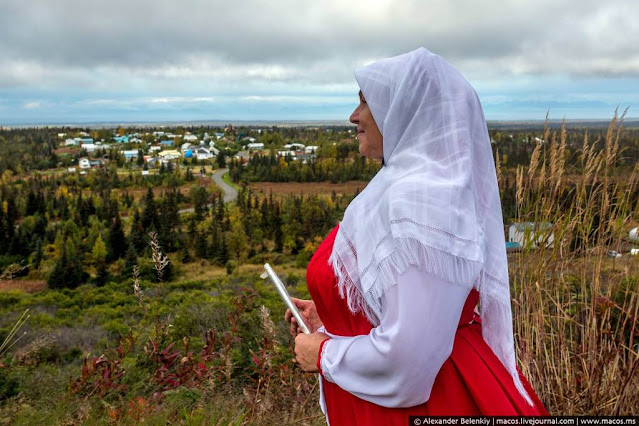We waited in a grocery store line behind a couple whose dress suggested some kind of tribal affiliation I didn't recognize or understand. The man, like this one, wore a great bushy beard. He had the look that said he was not afraid of work. But at what? I guessed farming.
His wife was caped like this woman, and her dress, similarly, had nothing in it of camo; it wasn't meant to hide. They certainly weren't Muslim but neither were they some odd Alaskan Mennonite sect. No Old Order Amish I'd ever seen dressed in such gaudy flamboyance, as if she were insisting on, rather than resisting, attention.
I didn't ask them. Could have, but didn't. I'd never seen any one dressed quite like that and told myself they could simply have been a bit eccentric. You can't help thinking rural Alaska has more than its share of folks who want nothing more than their privacy, to live off all kinds of grids.
The two of them paid for their goods and left. Nothing in their behavior toward the clerk or the bags of groceries they lugged out suggested fervent religious legalism, but I couldn't help but judge their dress to be some kind of religious statement. Seriously, they looked Depression-era, a couple Dorthea Lange might photograph--except for classy opulence of her dress--and the hood. It was no burqa.
At our second grocery store stop, three women and their children--the girls at least--were similarly dressed. Considerably younger, these women were meticulously made up, so much so they reminded me of rural South African white women, who surprised us at roadside stands in the wilds, hair and make up worthy of some magazine feature.
Like them, these Alaskan women were quite glamorous, long, dangling earrings, eye shadow, lipstick, make up, each of them hooded like this woman by the same vibrant prints of their fulsome, silky dress. They were not trying to cover their beauty; they purposed to be glamorous, but in their own unique way. This store was busy. No one else in line looked anything like them. It was clear they were dressing their way for a reason.
This time I asked. "Your dress--it's very beautiful. It's part of your religion?"
Young woman, maybe five kids. Getting them all into the car was requiring more attention than she cared to give, but she smiled at me, nodded, and said something I didn't understand, something about there being so many beautiful colors to choose from.
Let it go, I thought, and did.
Then, yet another line, this one in a bakery, put us beside yet another woman dressed and hooded in a flowery print, this one younger, maybe thirty, if that, dressed to kill--or die for.
She heard us talking and interrupted us. "You're tourists?" she said, the kind of question that made it clear she was interested. We did the ordinary salutations, and then I asked again, same question--"Your dress is beautiful. It's meant to indicate some specific faith?"
"Orthodox," she said, and a smile. She seemed more than grateful to have the opportunity to talk with tourists, or so it seemed. She took the occasion to say that she was Russian, although born here. She was with her mother, who looked very eastern European, a tiny woman in a head scarf. Her mother was also born here also, the daughter told us, in the States, in Oregon. She had never learned English, still spoke her own Russian.
Fascinating.
There's some difference of opinion on the whole Babel story. God saw that men were attempting to create something of an approach to the heavens, so he pulled a fast one and gave the workers each a separate language, creating a mess which ended construction of the place overnight, when the workers could no longer speak to each other. I'm quite sure when I first heard the Babel story, way back when I was a boy, the curse of languages was thought to be a result of sin.
May well be. What a curse that must have been for a bunch of working stiff suddenly incapable of saying "pass the wrench." And yet, for us, what a blessing. God could have made us all members of a single church, could have us all worship the same, dress the same, eat the same meats or vegetables, carry on in the same language.
But he didn't. He gave some to be Kenyans, others to be Japanese, still others to be Bolivians, and more to be Americans, as many as 650 separate languages spoken in the world today.
For a few years in the 90s, we had a handful of Russian students at the college where I taught. I found them fast talkers, fun people, but more than willing, it seemed, to bend the truth. None of them dressed like the women I'd seen in just a couple of days in Alaska, purposeful dressers who were unlike any I'd ever seen or met, as notable in a crowd as Old Order Amish or some Islamic sects, but unlike them, remarkably attractive. None of the women were shy in dress. They were not trying to hide.
But who were they? I had to wait to get home to find them. They're called Russian Old Believers.
More tomorrow.


No comments:
Post a Comment